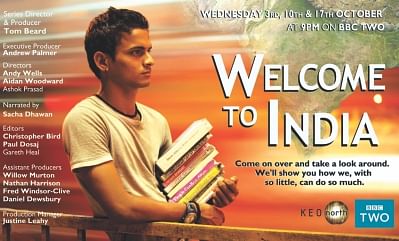| Home - Back Issues - The Team - Contact Us |
 |
| Volume 11 |Issue 47| November 30, 2012 | |
|
|
Impressions Street Children as
Human Resource Shah Husain Imam
A BBC Two programme titled Welcome to India recently featured three street children, two from Kolkata and one from Mumbai. Superficially, one may ask what is so special about some street-living kids that can make tourists feel welcome to India! Of course, we should not take it literally as the focus of the programme is to highlight how interesting and spicy life can be in India even among the underdogs. Thus, as the tale of three characters portrayed in the BBC documentary unwinds, you are touched by the sheer courage of their living and dreaming which rekindles hope in humanity's capacity for resilience, adaptation and survival, whatever the odds. Take Javed from Kolkata; he works through sludge and mud to recover gold dust and flakes slithering off the bangles and other gold ornaments with which the devotees take dips in the holy waters of the Ganges. Nothing is lost, even 'wear and tear' is recyclable wealth. Bangladeshi specimen of this livelihood can be found among the rag-pickers who collect empty cans and sell them to traders cheaply. They in turn export it to parties in China, so we are told, apart from perhaps feeding the canning or processing industry at home. Salman, who started hawking newspapers at age nine, now at 15, sells pirated books receiving a good commission. His ambition is to be in the Indian Navy or Army or set up an NGO for under-privileged ('he actually uses this word') children. His friend Ajay who had lost one of his arms while operating a hay machine in a farm, sells books, too. He has much better luck with customers since they take pity on his being partially crippled. Ajay sleeps in the municipal gardens along with his aunt and cousins. Rejesh's story is a bit complicated. He runs an illegal drinking den on Mumbai beaches; carrying a debt burden at high interest rate contracted with a loan shark. Dhaka has a large number of street children, abandoned by their parents or orphaned, who have to fend for themselves. Most of them do not like to beg, nor do they want to work as domestic workers, they prefer to earn their keep and stay independent, sometimes even supplementing parental income. They live in the backyard of the city, as an economic hinterland which we know very little about. Being vulnerable, many of them are preyed on by criminals and get used as errand boys or purveyors of drugs and small weapons. They are cogs of the underworld, so to speak. Street children have been politically used, more for the wrong reasons than for the right ones. Overall, they have been exploited in work places, more in informal than formal sectors. Street children sweetly translate into Pothoshishus, even poetically known as Pothokoli or street-buds as if waiting to bloom as wild flowers. State care has a long way to go to take them adequately under the wings of any designated and networked institution. A breath of fresh air has been injected into the lives of street children, on some scale, by Pothoshishu Sheba Shongothon, an organisation of volunteers working for destitute children. Its founder coordinator Brother Lucio Beninati, an Italian missionary of the Pontifical Institute for Foreign Missions, remains its moving spirit. He calls the condition of children living on the streets 'a tremendous scandal which The Street Children Volunteer Service is struggling against. With its 383 volunteers spread over 11 places in Dhaka city, the Shongothon provides access of the vulnerable children to healthcare, education, entertainment and shelter. The huge task of turning destitute children into manpower, however, requires volunteerism to blend with NGO and corporate private sector participation and involvement. The writer is Associate Editor, The Daily Star.
|
||
Copyright
(R) thedailystar.net 2012 |
